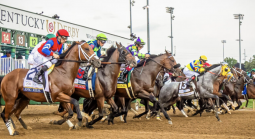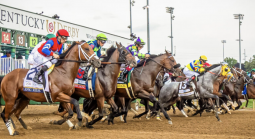California Sports Betting Propositions Go Down in Flames
Two sports betting ballot initiatives in the state of California failed miserably on Tuesday. There won't be legalized sports betting in the Golden State for at least another two years as a result, and that's probably being conservative.
Together the sports gambling push represented the most expensive ballot initiative effort in California state history with both sides going on to spend $600 million total.
But it was clear from the onset both propositions appeared dead on arrival.
Roger Salazar, a spokesperson for the No on 27 campaign, cast suspicion over the sportsbook-funded referendum's claim to be all about assisting the homeless.
"Proposition 27 is not about helping the homeless, it’s about 90% of the profits from online sports betting going to large out-of-state corporations as well as a deceptive attack on tribal sovereignty," Salazar tells NBC Los Angeles.
California tribes mostly backed Prop 26 but gambling attorney I. Nelson Rose, who regularly provides insight for the Gambling911.com website, expressed early on why this initiative would likely fail.
He claimed Prop 26 was designed to punish the state's card rooms out of pure vengeance.
"The tribes are furious that the clubs are offering '22'. making small changes in the rules for blackjack and throwing some jokers into the deck. Worse, the clubs got the State Legislature to allow games with a dealer-banker, usually an outside company with more than enough money to cover the bets of all the other players. The only limitation is the position must be offered to everyone at the table every third hand.
"The tribes claim that in practice, the clubs’ dealer-banker position does not actually rotate, making the games indistinguishable from casino banking games.
"So they sued, alleging unfair competition and public nuisance."
These were the two proposals as they appeared on the California ballot:
Proposition 26 ballot text: Authorizes New Types of Gambling. Initiative Constitutional and Statutory Amendment. Allows federally recognized Native American tribes to operate roulette, dice games, and sports wagering on tribal lands, subject to compacts negotiated by the Governor and ratified by the Legislature. Beginning in 2022, allows on-site sports wagering at only privately operated horse-racing tracks in four specified counties for persons 21 years or older. Imposes 10% tax on sports-wagering profits at horse-racing tracks; directs portion of revenues to enforcement and problem-gambling programs. Prohibits marketing of sports wagering to persons under 21. Authorizes private lawsuits to enforce other gambling laws.
Proposition 27 ballot text: Allows Online and Mobile Sports Wagering. Initiative Constitutional Amendment and Statute. Legalizes online and mobile sports wagering, which currently is prohibited, for persons 21 years and older. Such wagering may be offered only by federally recognized Indian tribes and eligible businesses that contract with them. Individuals placing bets must be in California and not located on Indian lands. Imposes 10% tax on sports-wagering revenues and licensing fees. Directs tax and licensing revenues first to regulatory costs, then remainder to: 85% to homelessness programs; 15% to nonparticipating tribes. Specifies licensing, regulatory, consumer-protection, and betting-integrity standards for sports wagering.
- Gilbert Horowitz, Gambling911.com















